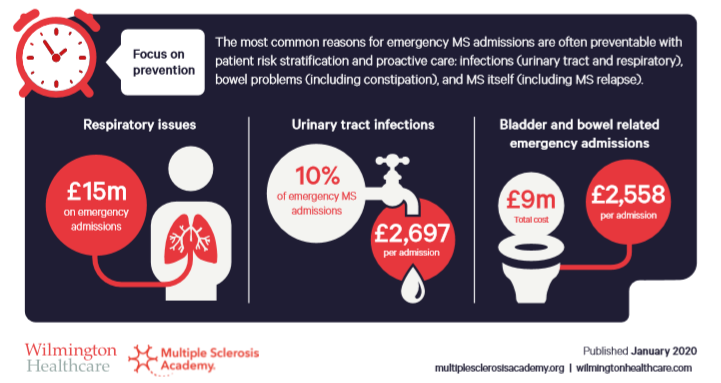

Emergency hospital admissions for people with multiple sclerosis (MS) are still on the rise and costing the NHS millions; yet many of them could be avoided, according to a new summary of data by healthcare intelligence provider Wilmington Healthcare and educator MS Academy.
The information, which updates the authors’ previous annual analysis of Hospital Episode Statistics (HES) from 2016/17, shows that emergency hospital admissions for people with MS in England have continually increased over the past three years. During 2018/19, 17.3% of people living with MS were admitted for an emergency, an increase of over 2,000 people.
According to the latest HES data, there were 30,310 emergency hospital admissions for people with MS in England during this time with a cost to the NHS of £86 million. This is an increase of £16 million when compared to 2016/17 data.
The average cost per emergency admission was £2,844 and the average length of stay was 7.6 days – yet a large proportion of this care could have been prevented.
Many of the emergency admissions were for problems that can be avoided with proactive, preventative care, earlier diagnosis and intervention in the community. For example, the report found that emergency admissions for respiratory issues like infections cost the NHS £15 million, whilst bladder and bowel problems cost £9.1 million.
Gavin Giovannoni, Professor of Neurology for the Blizard Institute, Barts and the London School of Medicine and Dentistry and Academic Director for MS Academy said:
We thought we were making progress, or at least treading water when it came to managing the complications of MS. However, the latest NHS England data suggests we are going backwards. It is clear that unplanned emergency admissions related to MS are increasing in number and cost to the NHS. In addition, the profile of complications is changing with admissions for respiratory issues topping the list. Does this mean that we have successfully tackled urinary tract infections? Unlikely as they continue to be a massive problem.
Can we do more with less? We think we can and this is why it is important for the wider MS community to engage with our activities in relation to raising the bar and tackling variation in the provision of MS services across the country. Without working differently and ensuring that no patient with MS is left behind we are not going to reverse these trends.
Sue Thomas, CEO of Wilmington Healthcare Consulting, said:
“Our latest report shows that the problems we have highlighted for people with MS in our annual analysis from as far back as 2013/14 only continue to grow.
“This is one reason why additional MS nurses, allied health professionals and neuro pharmacists are needed in the UK to provide regular assessment and preventative management strategies. With the right specialists and community-based support the NHS could significantly reduce the need for emergency hospital care for people with MS.”
“Preventative care strategies for people with MS must be reviewed in order to tackle problems, such as respiratory and urinary tract infections, at an early stage to try to avert the need for emergency care. This would not only be of huge benefit to patients, it would also reduce pressure on struggling A&E departments.”
MS Academy is working in partnership with voluntary sector and patient organisations and healthcare professionals to highlight the variation in current service provision. Managing Director Sarah Gillett said:
“It is disappointing to see that avoidable emergency hospital admissions for people with MS have continued to rise in the past year.
“Over the last two years, MS Academy has brought together partners from across the MS sector to highlight how current services need to change and to work practically together to deliver that change. Our ‘Raising the Bar’ work this year will continue to drive forward this agenda to address unwarranted variation and improve the experiences of people affected by MS.”